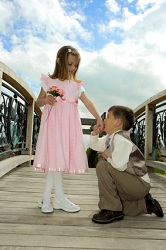 Marriage in Kansas is governed by Chapter 23 “Domestic Relations†in the Kansas statute. The definition of a Kansas marriage contract is between two parties of the opposite sex and is a civil contract—marriages of other kinds are considered to be void as they are in opposition of this policy. All incestuous marriages are also declared to be void. Kansas does not allow same-sex or common-law marriages.
Marriage in Kansas is governed by Chapter 23 “Domestic Relations†in the Kansas statute. The definition of a Kansas marriage contract is between two parties of the opposite sex and is a civil contract—marriages of other kinds are considered to be void as they are in opposition of this policy. All incestuous marriages are also declared to be void. Kansas does not allow same-sex or common-law marriages.
A Kansas marriage is formalized between two consenting people after a license has been issued by the State. Both parties in the marriage must make a declaration to be joined in front of an authorized officiating person and two witnesses, who must be over the age of 18. The officiating person does not count as a witness. An officiating person may be: an ordained clergyman or religious authority, a licensed officiator or appointee of a bishop serving as the regular clergyman of a church, a judge or justice of a court of record, a municipal judge of a city in Kansas and retired judges or justices of a court of record.
Marriages that occur in Kansas will be registered under the Secretary of Health and Environment. A marriage license can not be issued until three ‘business days’ after the application and expire in six months. The cost for a marriage license is $50 plus a $25 fee of the judicial branch. Marriage licenses will be kept on file at the district court at which the marriage license was applied.
The officiating person of the marriage ceremony must endorse the marriage certificate on the license, give a copy to the parties of the marriage and return the license within 10 days of the marriage ceremony to the judge or clerk who issued it. The judge or clerk will record the marriage and then forward it to the Secretary of Health and Environment before the third day of the following month.















You are all wet because Kansas is very archaic and they do allow common law unions. I know because I have known many people in them, one was my daughter and her b/f……..
If you have joint property, you must get a legal divorce or seperation.
I was told prenuptial agreement in ks is optional? My bf and I prefer not to sign one. We don’t feel need to. Do we have to in order to get our marriage license?